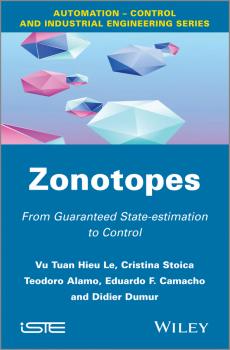Didier Dumur
Список книг автора Didier DumurCO2 Biofixation by Microalgae. Modeling, Estimation and Control
Due to the consequences of globa l warming and significant greenhouse gas emissions, several ideas have been studied to reduce these emissions or to suggest solut ions for pollutant remov al. The most promising ideas are reduced consumption, waste recovery and waste treatment by biological systems. In this latter category, studies have demonstrated that the use of microalgae is a very promising solution for the biofixation of carbon dioxide. In fact, these micro-organisms are able to offset high levels of CO2 thanks to photosynthesis. Microalgae are also used in various fields (food industry, fertilizers, biofuel, etc.). To obtain a n optimal C O2 sequestration us ing micr oal gae, their cul tivatio n has to be c arried ou t in a f avorable e nvironment, corresponding to optimal operating conditions (temperature, nutrients, pH, light, etc.). Therefore, microalgae are grown in an enclosure, i.e. photobioreactors, which notably operate in continuous mode. This type of closed reactor notably enables us to reduce culture contamination, to improve CO2 transfer and to better control the cultivation system. This last point involves the regulation of concentrations (biomass, substrate or by-product) in addition to conventional regulations (pH, temperature). To do this, we have to establish a model of the system and to identify its parameters; to put in place estimators in order to rebuild variables that are not measured online (software sensor); and finally to implement a control law, in order to maintain the system in optimal conditions despite modeling errors and environmental disturbances that can have an influence on the system (pH variations, temperature, light, biofilm appearance, etc.).
Zonotopes. From Guaranteed State-estimation to Control
This title focuses on two significant problems in the field of automatic control, in particular state estimation and robust Model Predictive Control under input and state constraints, bounded disturbances and measurement noises. The authors build upon previous results concerning zonotopic set-membership state estimation and output feedback tube-based Model Predictive Control. Various existing zonotopic set-membership estimation methods are investigated and their advantages and drawbacks are discussed, making this book suitable both for researchers working in automatic control and industrial partners interested in applying the proposed techniques to real systems. The authors proceed to focus on a new method based on the minimization of the P-radius of a zonotope, in order to obtain a good trade-off between the complexity and the accuracy of the estimation. They propose a P-radius based set-membership estimation method to compute a zonotope containing the real states of a system, which are consistent with the disturbances and measurement noise. The problem of output feedback control using a zonotopic set-membership estimation is also explored. Among the approaches from existing literature on the subject, the implementation of robust predictive techniques based on tubes of trajectories is developed. Contents 1. Uncertainty Representation Based on Set Theory. 2. Several Approaches on Zonotopic Guaranteed Set-Membership Estimation. 3. Zonotopic Guaranteed State Estimation Based on P-Radius Minimization. 4. Tube Model Predictive Control Based on Zonotopic Set-Membership Estimation. About the Authors Vu Tuan Hieu Le is a Research Engineer at the IRSEEM/ESIGELEC Technopôle du Madrillet, Saint Etienne du Rouvray, France. Cristina Stoica is Assistant Professor in the Automatic Control Department at SUPELEC Systems Sciences (E3S), France. Teodoro Alamo is Professor in the Department of Systems Engineering and Automatic Control at the University of Seville, Spain. Eduardo F. Camacho is Professor in the Department of Systems Engineering and Automatic Control at the University of Seville, Spain. Didier Dumur is Professor in the Automatic Control Department, SUPELEC Systems Sciences (E3S), France.

